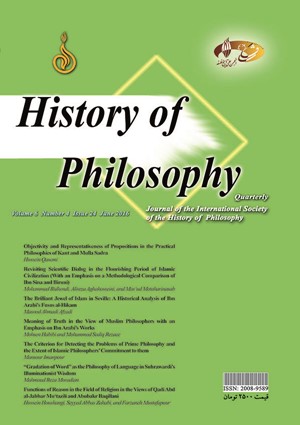Objectivity and Representativeness of Propositions in the Practical Philosophies of Kant and Mulla Sadra
Subject Areas :
Abstract :
Kant, the modern philosopher, believes that the development of Man’s moral life depends on designing a moral system the principles of which are based on reason and objectivity. In this way, it would be free from any kind of subjectivity and personal bias, which damaged the moral system of his period. The only proposition which enjoys these features is the categorical imperative. Now, the problem is how Kant justifies the objectivity and truth of this imperative. Another question is how this problem is answered in Mulla Sadra’s Islamic philosophy. In his Critique of Practical Reason, Kant maintains that practical matters are rooted in the moral law and tries to justify them by resorting to practical reason and the notion of freedom. Although Kant’s discussions in the field of philosophy of ethics proceed in a way to demonstrate nomena and, particularly, freedom, he considers them to be among axioms. This means that the reality of practical reason and freedom only justify the practical possibility of moral experience and other practical fields. In other words, admitting the reality of the intellect and freedom is merely based on belief and faith, consequently, moral propositions are rational rather than cognitional. In Mulla Sadra’s Transcendent Philosophy, practical propositions in individual and social fields are developed based on practical reason while attending to its relationship with theoretical reason. Moreover, the realms of both theory and practice stem from the innermost of the soul and are known through presential knowledge. As a result, all mental and rational perceptions are related to the truth of the good and its grades as an ontological affair. In this way, the objectivity and truth of these propositions are justified not based on certain axioms but by resorting to the possibility of the presential knowledge of the world of fact-itself. In this paper, the writer has tried to discuss the truth and objectivity of propositions in practical philosophy through employing a comparative method and the analysis of the philosophical principles of Kant and Mulla Sadra in order to highlight the importance of the principles of the Transcendent Philosophy.
ابن¬سينا، النفس من کتاب الشفا، تحقيق حسن حسن¬زاده الآملي، قم: مکتبة الاعلام الاسلامي،چ2، 1385.#
ابن¬سينا، الالهيات من کتاب الشفاء، تحقيق حسن حسن¬زاده الآملي، قم: انتشارات دفتر تبليغات اسلامي، چ1، 1376. #
ابن¬سينا، الاشارات و التنبيهات، قم، نشر البلاغه، 1375. #
ساليوان، راجر، اخلاق در فلسفه¬ کانت، ترجمه عزت الله فولادوند، تهران، نشر طرح نو، 1380. #
طباطبائي، محمد حسين، اصول فلسفه و روش رئاليسم، پاورقي مرتضي مطهري، انتشارات صدرا، چ6، ج5، 1375. #
ملاصدرا، الحکمة المتعالية في¬الاسفار الاربعة العقلية، ج2، تصحيح، تحقيق و مقدمه مقصود محمدي، تهران: انتشارات بنياد حکمت اسلامي صدرا، چ1، 1380. #
ملاصدرا، الحکمة المتعالية في¬الاسفار الاربعة العقلية، ج3، تصحيح، تحقيق و مقدمه مقصود محمدي، تهران، انتشارات بنياد حکمت اسلامي صدرا، چ1، 1383. #
ملاصدرا، الحکمة المتعالية في¬الاسفار الاربعة العقلية، ج4، تصحيح، تحقيق و مقدمه مقصود محمدي، تهران، انتشارات بنياد حکمت اسلامي صدرا، چ1، 1383. #
ملاصدرا، الحکمة المتعالية في¬الاسفار الاربعة العقلية، ج6، تصحيح، تحقيق و مقدمه احمد احمدي، تهران، انتشارات بنياد حکمت اسلامي صدرا، چ1، 1381. #
ملاصدرا، الحکمة المتعالية في¬الاسفار الاربعة العقلية، ج7، تصحيح، تحقيق و مقدمه مقصود محمدي، تهران، انتشارات بنياد حکمت اسلامي صدرا، چ1، 1380. #
ملاصدرا، الحکمة المتعالية في¬الاسفار الاربعة العقلية، ج8، تصحيح، تحقيق و مقدمه علياکبر رشاد، تهران، انتشارات بنياد حکمت اسلامي صدرا، چ1، 1383. #
ملاصدرا، الحکمة المتعالية في¬الاسفار الاربعة العقلية، ج9، تصحيح، تحقيق و مقدمه رضا اکبريان، تهران، انتشارات بنياد حکمت اسلامي صدرا، چ1، 1382. #
ملاصدرا، الشواهد الربوبية في¬المناهج السلوکية، تصحيح، تحقيق و مقدمه سيد مصطفي محقق داماد؛ باشراف استاد سيد محمد خامنه¬اي، انتشارات بنياد حکمت اسلامي صدرا، چ2، 1382. #
ملاصدرا، شرح الاصول الکافي، تصحيح و تحقيق و مقدمه رضا استادي، تهران، انتشارات بنياد حکمت اسلامي صدرا، چ1، 1384. #
ملاصدرا، مفاتيح الغيب، تصحيح و تحقيق و مقدمه نجفقلي حبيبي، تهران، انتشارات بنياد حکمت اسلامي صدرا،چ1، 1386. #
ملاصدرا، کسر اصنام الجاهلية، مقدمه و تصحيح و تعليق محسن جهانگيري، تهران، انتشارات بنياد حکمت صدرا، چ1، 1381. #
جوادي آملي، عبدالله، رحيق مختوم، قم، نشر اسراء بخش چهارم از ج2، چ3، 1386. #
حسن زاده آملي، حسن، اتحاد عاقل به معقول، قم، انتشارات قيام، 1375. #
دلوز، ژيل، فلسفه نقادي کانت، ترجمه مهدي پارسانيا، تهران، گام نو، چ2، 1389. #
کانت، ايمانوئل، صلح پايدار، ترجمه محمد صبوري، تهران، به باوران، چ1، 1380. #
Caygill, Haward, A Kant Dictionary, Blacwell, 2000. #
Kant, Immanuel, The Works of Immanuel Kant, translated and edited by Mary J. Gregor, Cambridge, Cambridge University Press, 1996. #
Kant, Immanuel, Critique of Pure Reason, translated by Paul Guyer and Allen W. Wood, Cambridge, Cambridge University Press, 1998. #
Kemp Smith, Norman, A Commentary to Kant’s Critique of Pure Reason, England, Palgrave Macmillan, 2003. #
Liddell, B.E.A., Kant on the Foundation of Morality, Bloomington and London, Indian University Press, 1970. #
Paton, H. J., Categorical Imperative, A Study in Kant’s Moral Philosophy, London, Hutchinson University, 1947. #
White Beck, lewis, A Commentary on Kant’s Critique of Practical Reason, Chicago University Press, 1990. #

